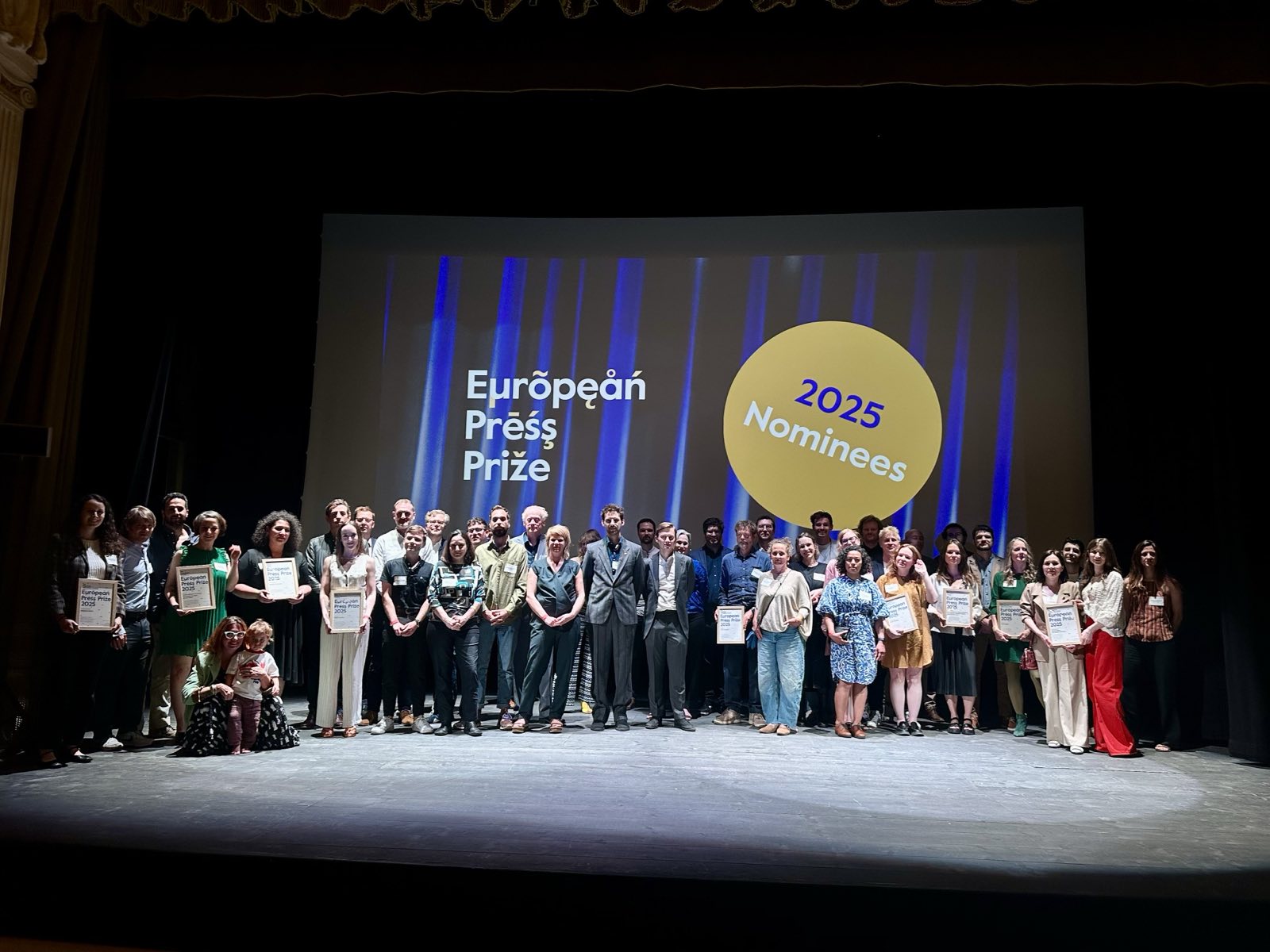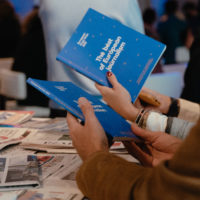Winners of the European Press Prize 2025 – Bravery and resilience in a tumultuous year for independent media
The six Winners of the European Press Prize 2025 showcase the finest journalism in Europe as the industry continues to navigate crisis.

In yet another challenging year for independent media, the Winners of the 2025 European Press Prize show the value and fortitude of high quality journalism. With investigations and commentaries ranging in focus from the pervasive influence of the Kremlin in European elections to the everlasting scars of the black market adoption industry, this year’s Winners have shone a light on some of the most pressing and underrepresented issues facing the continent today. The Winners demonstrated excellence in reporting – in substance, style, innovation, and impact.
Ahead of the 2025 Award Ceremony, Alan Rusbridger, Chair of the Panel of Judges, said:
“Such bravery, such imagination, such flair, such integrity! Here are writers and photographers; editors and data journalists; coders and videographers tackling the most important issues of the day and doing it in ways that are compelling and vital. The European Press Prize is the best antidote to gloom. There is – understandably – so much anxiety about the state of the news business today that it’s easy to forget that extraordinary work is still being done by committed journalists all over Europe, and beyond.”
The full list of Winners and Runners-Up is available here.
From 810 submissions to six Winners
The long process of selecting our Winners and Runners-Up started all the way back in October 2024 when this year’s Prize first opened for entries. Between then and 14 December, over 800 applications from 44 countries were submitted across our five Award Categories:
- The Distinguished Reporting Award
- The Innovation Award
- The Investigative Journalism Award
- The Migration Journalism Award
- The Public Discourse Award
As well as the five main Categories, each year, the judges are empowered to present a Special Award for particular excellence.
The Winners were announced at the 2025 Award Ceremony in Bari, Italy on 28 May. Each Award is worth €10,000, to be spent wherever possible on a personal project that may, in turn, enrich the practice of journalism.
The Distinguished Reporting Award goes to “Did Something Happen to Mom When She Was Young?”, by Jessica Bateman.
Summary: This piece shines a light on a forgotten part of 20th century history that has been chronically overlooked by both historians and journalists: the politically motivated adoptions of Greek children after the country’s brutal civil war, and how this led to the establishment of the international adoption industry. The project sets out in great detail how the majority of these black market adoptions were likely carried out and the mechanics of what one historian has termed “forced consent”.
What the judges said: “Bateman’s writing transports us right there to the family reunions, to the inner thoughts and feelings of those affected by this scandal. The personal and political are skillfully intertwined to give these individual stories a wider resonance. This is a forgotten but important and illuminating part of postwar European history, brilliantly brought to life.”
Runner-Up: “René Damgaard Is Saying a Final Goodbye to Life and to His Niece” by Line Vaaben.
What the judges said: “This story portrays the end of life in its raw, unvarnished, not sugar-coated reality, using genuine human stories and exceptional photographs.”
—
The Innovation Award goes to “Under Surveillance. How Location Data Jeopardizes German Security”, an investigation by Katharina Brunner, Rebecca Ciesielski, Ingo Dachwitz, Sebastian Meineck, and Maximilian Zierer.
Summary: Many smartphone apps only work if users share their location. In this investigation, a team of reporters analysed 3.6 billion location data points that originated from millions of people in Germany, which data brokers offer on online marketplaces. The movement profiles reveal daily routines, places of residence, and commuting routes of many people in Germany, including thousands of security-relevant individuals who presumably work for the Bundeswehr, German or foreign intelligence services.
What the judges said: “A clever idea to use these techniques against the people who are doing it to us. They completely nailed it, in a responsible way. The scale of what is there for sale was just shocking.”
Runner up: “Road to Redemption: How Israel’s War Against Hamas Turned Into a Springboard for Jewish Settlement in Gaza”, by Yarden Michaeli, Avi Scharf, Idit Frenkel, Asi Oren, Uri Talshir.
What the judges said: “It’s gripping. It’s another way to look at the situation in Palestine. The divide that’s provided by this corridor. It was brilliantly executed and the innovation comes from that. The narrative comes first, the innovation supports the narrative in a way that makes it so strong.”
—
The Investigative Reporting Award goes to “Serving Moscow”, by Măriuța Nistor and Natalia Zaharescu.
Summary: This story looks into the Russian influence on the presidential elections and the referendum on European integration held in Moldova in October and November 2024. The Russian Federation acted in Moldova through a network of tens of thousands of people, coordinated from Moscow by the oligarch Ilan Șor. In this piece, Ziarul de Garda proves this strong interference in the elections in Moldova, infiltrating the Șor network and documenting their activities from the inside, using hidden cameras and false identities.
What the judges said: “A mind-blowing undercover investigation showing how Russian money and networks of influence operated in Moldova — paying off people in cash to show up at rallies and vote against pro-EU candidate Maia Sandu.”
Runner-Up: “Bismarck’s Hut in the Forest”, by Aiko Kempen, Laurenz Schreiner, and Finn Starken.
What the judges said: “A clean, well explained, well told, humorous, flowing investigation – I love it. The fact that this is happening in record-fixed Germany is shocking on its own.”
—
The Public Discourse Award goes to “Mothers at the End of the World”, by Katarzyna Boni.
Summary: In this essay, Katarzyna Boni merges her experiences on a trip to Spitsbergen with those of Elizabeth Rush, who spent seven weeks on an icebreaker with scientists exploring the Thwaites Glacier in West Antarctica. The piece delves into what it means to become a mother during a time of global crisis, what responsibilities we have toward our children, and how we should raise them when the world around us is ending.
What the judges said: “An original piece that interweaves personal experience, climate change, parenting, and the carbon footprint. Almost a piece of moral philosophy which was skillfully told.”
Runner-Up: “Memory Machines”, by Jessica Traynor.
What the judges said: “Superb. Really strong writing, covering a topic that is covered a lot – but not in this way. I really liked the effort that she does to make the reader connect with the importance of memories – both the memories of a nation and the personal ones.”
—
The Migration Journalism Award goes to “Growing Up ‘Non-Western’ in Denmark’s Nanny State”, by Gabriela Galvin.
Summary: Since 2019, all families in Denmark’s “ghettos” or “parallel societies” – official labels for neighbourhoods that meet criteria on education, crime, employment, and, crucially, ethnic composition – have been required to send their kids to daycare when they turn one year-old or risk losing public benefits, in a bid to teach them Danish “traditions, norms, and values.” This article tells the story of how the daycare rules affect the families they target.
What the judges said: “A brilliantly nuanced and detailed piece, which looked at all complexities of immigration and migration in Europe.” and “A really complex migration story which is well reported with tons of context.”
Runner-Up: “The Brutal Truth Behind Italy’s Migrant Reduction: Beatings and Rape by EU-Funded Forces in Tunisia”, by Mark Townsend.
What the judges said: “A gripping, graphic read – by good reporting this story demonstrated how complex and brutal the consequences are of things that seem like easy solutions. That really helped understand this better.”
—
The Special Award is presented to Abzas Media and Forbidden Stories for “The Baku Connection Project”, coordinated by Forbidden Stories and their 15 media partners.
Summary: Following the arrest of their colleagues in Azerbaijan, 40 journalists from 15 media outlets continued the work of Abzas Media under the coordination of Forbidden Stories. In November 2023, Abzas journalists Ulvi Hasanli, Sevinc Vaqifqizi, and the team’s administrative member Mahammad Kelakov were arrested. Behind prison walls today, Abzas Media journalists were among the last in the country to investigate the abuses of the powerful Aliyev regime, delving into issues of corruption, pollution, and human rights.
What the judges said: “Pure collaboration and solidarity in the profession.” and “It addresses an issue with journalists and activists in jail – journalists all over Europe keep investigating Azerbaijani corruption after journalists there were imprisoned for showing corruption.”
The European Press Prize in Italy
2025 marked the first year that the European Press Prize Award Ceremony took place in Italy. The event was co-organised in collaboration with Cime Puglia – event and exhibition organiser in the heart of Bari. Ahead of the event, Jennifer Athanasiou-Prins, Executive Director at the European Press Prize said:
“Collaborating with Cime for our 2025 Award Ceremony in Bari was a natural choice, especially given our commitment to fostering meaningful connections between our European network of journalists and the local journalistic community in each city we visit.”
The 2025 Award Ceremony was moderated by Sara Manisera, journalist and co-founder of the FADA Collective. Sara, together with co-author Daniela Sala, won our 2024 Investigative Reporting Award for the project “Iraq Without Water: The Cost of Oil to Italy“.
Alan Rusbridger, journalist, editor of Prospect magazine, former editor-in-chief of the Guardian, and Chair of the Prize’s Panel of Judges delivered a keynote speech on the current state of the media landscape and the future of independent media in Europe.
About the European Press Prize
The European Press Prize celebrates the highest achievements in European journalism. It is made possible by a number of foundations and organisations that strive to encourage quality journalism in Europe: Democracy and Media Foundation, iMEdD – Incubator for Media Education and Development, Jyllands-Posten Foundation, Media Development Investment Fund, Politiken Foundation, the Scott Trust, The Irish Times Trust Limited, and Stichting Veronica. Additionally, support for the European Press Prize’s Migration Journalism Award comes from the Robert Bosch Stiftung.





